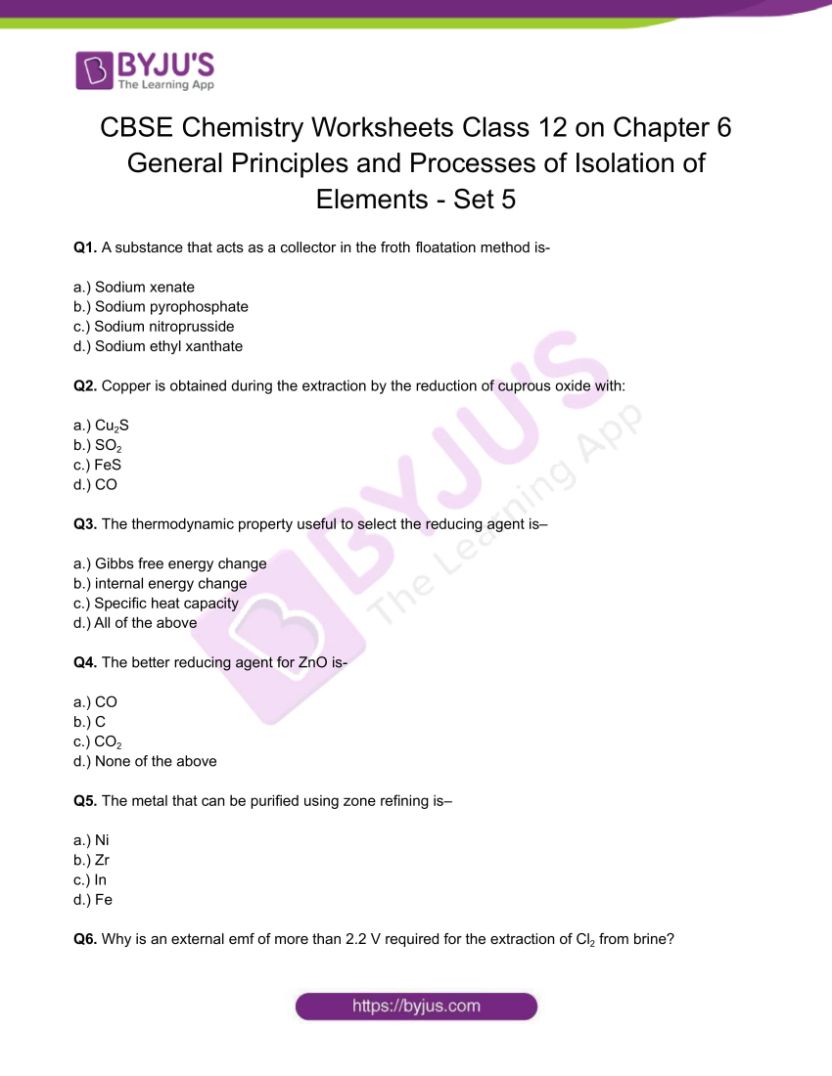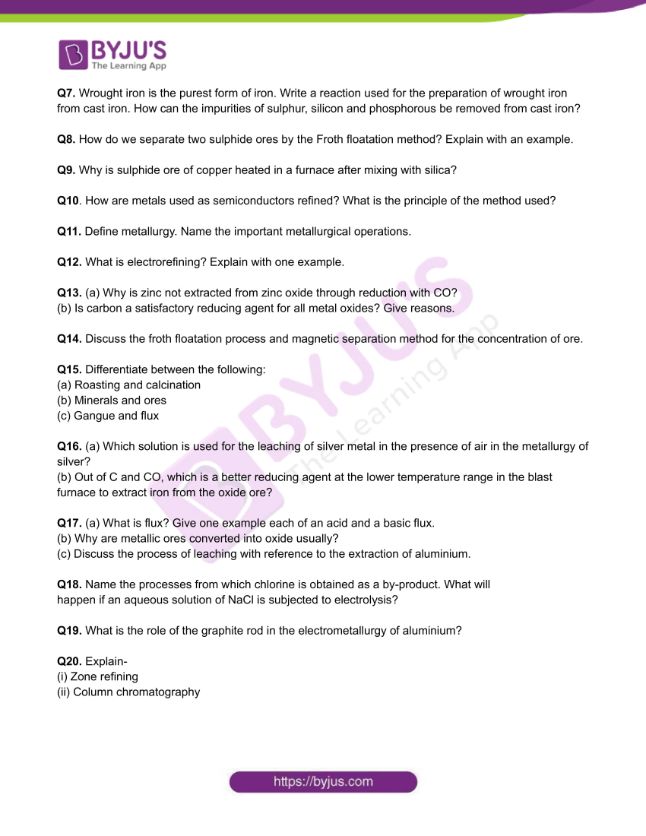All materials on the earth are composed of different elements. These elements are distributed in all three main parts of the earth– atmosphere, hydrosphere and lithosphere. Elements occur in nature either in the combined state or in a free state. Those occurring in free state or native are few. Metals occurring in free state are copper, silver, gold, platinum and other platinum group metals. Non-metals occurring in the free state are carbon, sulphur, nitrogen, oxygen and noble gases. The periodic table is dominated by metals because of all the elements known about 80 % are metals. The extraction of pure metals from their ores is known as metallurgy.
Reactivity-based methods are used to extract metals from their ores. Highly reactive metals are extracted from ores using electrolysis, whereas medium reactivity metals are extracted using calcination, roasting, and reduction methods. Roasting and refining are processes used to extract low-reactivity metals from their ores.
Download Class 12 Chemistry Worksheet Chapter 6 General Principles and Processes of Isolation of Elements PDF – Set 5
CBSE Class 12 Chemistry Chapter 6 General Principles and Processes of Isolation of Elements Worksheet – Set 5
Q1. A substance that acts as a collector in the froth floatation method is-
a.) Sodium xenate
b.) Sodium pyrophosphate
c.) Sodium nitroprusside
d.) Sodium ethyl xanthate
Q2. Copper is obtained during the extraction by the reduction of cuprous oxide with:
a.) Cu2S
b.) SO2
c.) FeS
d.) CO
Q3. The thermodynamic property useful to select the reducing agent is–
a.) Gibbs free energy change
b.) internal energy change
c.) Specific heat capacity
d.) All of the above
Q4. The better reducing agent for ZnO is-
a.) CO
b.) C
c.) CO2
d.) None of the above
Q5. The metal that can be purified using zone refining is–
a.) Ni
b.) Zr
c.) In
d.) Fe
Q6. Why is an external emf of more than 2.2 V required for the extraction of Cl2 from brine?
Q7. Wrought iron is the purest form of iron. Write a reaction used for the preparation of wrought iron from cast iron. How can the impurities of sulphur, silicon and phosphorous be removed from cast iron?
Q8. How do we separate two sulphide ores by the Froth floatation method? Explain with an example.
Q9. Why is sulphide ore of copper heated in a furnace after mixing with silica?
Q10. How are metals used as semiconductors refined? What is the principle of the method used?
Q11. Define metallurgy. Name the important metallurgical operations.
Q12. What is electrorefining? Explain with one example.
Q13. (a) Why is zinc not extracted from zinc oxide through reduction with CO?
(b) Is carbon a satisfactory reducing agent for all metal oxides? Give reasons.
Q14. Discuss the froth floatation process and magnetic separation method for the concentration of ore.
Q15. Differentiate between the following:
(a) Roasting and calcination
(b) Minerals and ores
(c) Gangue and flux
Q16. (a) Which solution is used for the leaching of silver metal in the presence of air in the metallurgy of silver?
(b) Out of C and CO, which is a better reducing agent at the lower temperature range in the blast furnace to extract iron from the oxide ore?
Q17. (a) What is flux? Give one example each of an acid and a basic flux.
(b) Why are metallic ores converted into oxide usually?
(c) Discuss the process of leaching with reference to the extraction of aluminium.
Q18. Name the processes from which chlorine is obtained as a by-product. What will
happen if an aqueous solution of NaCl is subjected to electrolysis?
Q19. What is the role of the graphite rod in the electrometallurgy of aluminium?
Q20. Explain-
(i) Zone refining
(ii) Column chromatography
Download PDF to access answers of Chemistry Worksheet for Class 12 Chemistry Chapter 6 General Principles and Processes of Isolation of Elements set -5.
Download PDF
Read Also:
- General Principles and Processes of Isolation of Elements Class 12 Notes Chapter 6
- General principles and Processes of Isolation of Elements MCQs
- NCERT Solutions for Class 12 Chemistry Chapter 6 General Principles and Processes of Isolation of Elements
- Important Questions for Class 12 Chemistry Chapter 6 – General Principles and Processes of Isolation of Elements


Comments